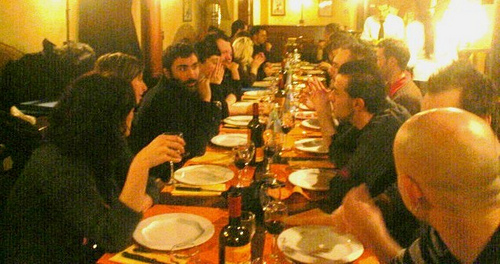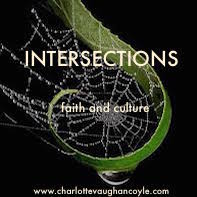Some years ago, when I visited a friend who lived in a nursing home, she introduced me to her meal time table mates and then reminded everyone of the ground rules for their table conversations: “No talk about religion, politics or bowel movements.” I still smile every time I tell this story.
There are good reasons we don’t usually venture into conversation about religion and politics whenever we gather for Thanksgiving or family reunions. Deeply held beliefs can lead to deep divides if these conversations become battlegrounds. Families who care about each other may well decide that maintaining relationship is more valuable than winning arguments. I agree.
But there is another way to be in conversation together besides “winning”; a way that maintains and even cultivates relationship through the process of discussing our various opinions and perspectives  about religion and politics.
about religion and politics.
Listening to others who think differently than we, coming to understand what motivates them, respecting their voice, growing in awareness, even (maybe) changing our mind about some things … authentic conversation around controversial issues is not impossible. In fact, in our contentious society these days, it is crucial: we must figure out how to talk and listen to each other again.
A minister colleague blogged recently about this very dilemma within the context of the broad cyberspace Christian community. His wisdom also applies to civil conversation within any diverse community. John Pavlovitz recommends these two attitudes that can foster helpful dialogue:
First: each of us has made our own journey to where we are and no one can change that. We all have been shaped by the experiences and people in our lives and we are each “the product of our specific journey.” None of us speaks from an objective truth; we’re all sharing our best guess based on what we can see from where we’re standing.
And second: even if we come to vastly different conclusions, there’s a very good chance we are motivated by similar passions. Among people of faith, most of us truly want to serve and love God. Among citizens of our nation, most of us truly want to promote what is good for our country. How we live that out can be “vastly different,” but it helps to identify some of our common passions when we are making an effort to have a meaningful conversation.
Like Pavlovitz, I am a Christian minister who yearns to converse with people who see the world differently than I. My own story of moving away from my fundamentalist origins demonstrates how open, honest, welcoming conversations can help people grow and change.
Pavlovitz’s dream is my own:
It may be a pipe dream, but I want better for all of us as we wrestle with the deepest things of this life. I certainly want more for my writing and my efforts as a minister.
I don’t want to be the kind of Christian who only loves those who love me first, or those who appear most lovable from a distance. (Jesus was pretty clear about all that.)
I have no interest in being a pastor who preaches only to the applauding choir of those who agree with him. I want to speak to the greater congregation, even if it means getting shouted down sometimes.
I aspire to a faith that sets a wide open table and truly welcomes the full diversity of perspectives there, seeing it all as valid and beautiful. I’m hopeful for theological discussions where no one’s dignity is lost.
This is the only way forward for me that makes any sense. It’s the prayer I have for you and for me, even if we don’t align in any number of ways.
It may be a pipe dream that we can cultivate this kind of open table conversation whenever we talk about religion or politics in this contentious climate. But I refuse to give up on the dream of reclaiming a culture of civil dialogue.
Let’s all start where we are: One friend over coffee. Respectful posts on our Facebook pages and respectful disagreements in our comments. Listening deeply to identify our common passions and building honest dialogue from that common ground.
Let’s learn together how conversation can actually help build relationships instead of damaging them.
I’m not giving up. I hold on to hope. Maybe you do too.
John Pavlovitz.com “Stuff that Needs to be Said”
The Coffee Party USA is partnering with Living Room Conversations to get the ball rolling on our quest to encourage the use of civility and reason all across America. Sign up on the website to host a Coffee Party Talk in your neighborhood…
http://www.coffeepartyusa.com/coffee_party_talks
Image credit: BALI
 Charlotte Vaughan Coyle lives in Paris TX and blogs about intersections of faith, culture and politics on her website and Intersections Facebook page. She frequently shares her thoughts with Coffee Party USA as a regular volunteer.
Charlotte Vaughan Coyle lives in Paris TX and blogs about intersections of faith, culture and politics on her website and Intersections Facebook page. She frequently shares her thoughts with Coffee Party USA as a regular volunteer.
Charlotte is an ordained minister within the Christian Church (Disciples of Christ) and also blogs about Scripture from a progressive Christian approach in her Living in The Story Musings.

I agree with your perspective, but would like to add a few points.
When we listen to the thoughts (and beliefs) of others we should gain a better understanding of how and why they have made the decisions they have.
” Understanding” to me is the key value in finding common ground in the effort to getting along…sometimes we can fully agree and other times we will agree to disagree, but only understanding can give you the insight needed!
Hearing the perspective of others should give us the ability to assess the issues at hand more fully, hopefully during this “conversation” both parties will “see” the others point of view and make the required adjustments to their position for the optimum outcome!
Thank you for your post.
Ivar Plavinskis.